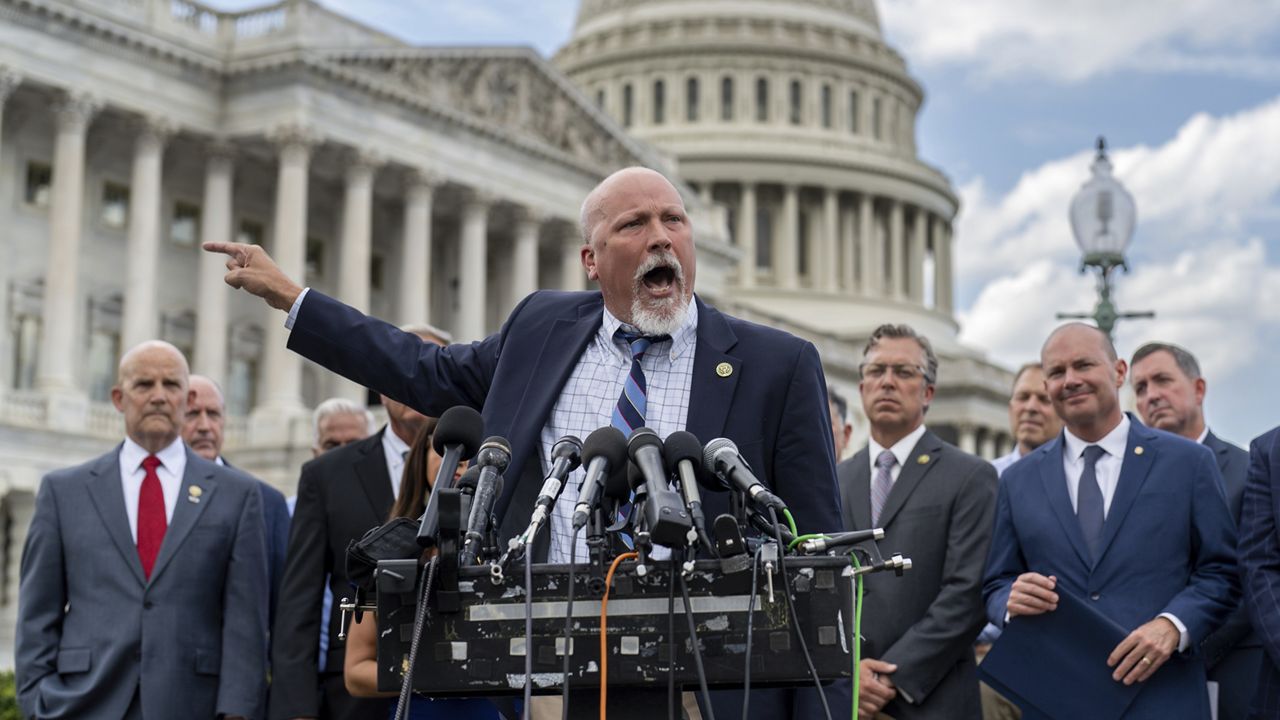With both chambers of Congress back in session and less than three weeks until the deadline to find an agreement to keep the government funded, the conservative House Freedom Caucus on Tuesday made clear they will not support a stopgap funding measure -- known as a continuing resolution -- to avoid a shutdown.
“Under no circumstances should we have a dirty CR or a clean CR, so-called, on Oct. 1, that should not be on the table,” Rep. Chip Roy, R-Texas, said at a House Freedom Caucus press conference on Tuesday.
A short-term extension would allow lawmakers to keep the government funded past the end of the fiscal year on Sept. 30 and buy them time to work out a larger spending plan for the next fiscal year.
Congressional leaders on both sides of the aisle have talked about a CR as likely their best bet at averting a government shutdown on Oct. 1. The White House officially asked Congress to pass such a stopgap measure earlier this month.
But the Freedom Caucus threw another layer in the funding fight when it released a letter last month saying its members will not support a CR unless it includes a slate of their priorities – a stance members of the group strongly reiterated on Tuesday.
“We're not interested in a continuing resolution that continues the policies and the spending of the Biden-Schumer-Pelosi era and we're not going to vote for it,” HFC Chair Rep. Scott Perry, R-Pa., said on Tuesday.
Such House Republican priorities are very unlikely to pass the Democratic-controlled Senate or win President Joe Biden’s signature.
House Speaker Kevin McCarthy, R-Calif., can only lose a handful of Republicans in the House to pass a continuing resolution with only GOP support. If he cuts a deal with Democrats in the chamber to pass one, he risks pushback from conservatives in his caucus.
Rep. Matt Gaetz, R-Fla., made clear on Tuesday that, in his view, if McCarthy puts a continuing resolution on the floor, it will lead to an effort to oust the speaker.
“Continuing resolution, motion to vacate,” Gaetz said.
As McCarthy fought to win the speaker’s gavel in January, he reached agreements with some conservative Republicans, including that any one member can force a vote to remove him from the position, known as a motion to vacate.
Gaetz on Tuesday also warned McCarthy that he was “out of compliance” with other agreements made during the speakership battle. Roy made a similar argument but would not say if he agrees with pursuing a motion to vacate if a continuing resolution is brought to the floor.
“We talked about reducing spending, that was a part of the agreement, we all know that and we talked about it publicly and we haven't done that. Period. Full stop,” Roy said, also mentioning they have not brought a bill to the floor on term limits for members of Congress.
Earlier this year, the deal McCarthy and Biden cut to suspend the nation’s debt limit and keep the U.S. from defaulting included agreements for the next fiscal year aimed at reining in spending to get GOP support.
But it was not enough for some in the GOP’s right flank, who subsequently held up the House floor for days in protest.
Soon after, Texas Rep. Kay Granger, the chair of the House Appropriations Committee, said House Republicans will mark up next fiscal year’s spending bills below the levels in the debt deal, arguing they are a ceiling, not a floor.
The Senate has marked up its bills in line with the levels set by McCarthy and Biden, putting the two chambers at odds.
Before Congress left for the August break, the House passed one of 12 spending bills and abandoned a plan to vote on a second.
The White House is also going on the offensive this week, seeking to highlight how House Republicans are reneging on the debt limit deal. In a memo from the Office of Management Budget released Tuesday, Director Shalanda Young outlined the proposed cuts in House spending bills, stressing it would lead to budget cuts for schools with low-income students, budget and personnel cuts to federal law enforcement agencies and the IRS,and cutting clean technology and pollution reduction programs.
Spectrum News’ David Mendez contributed to this report








